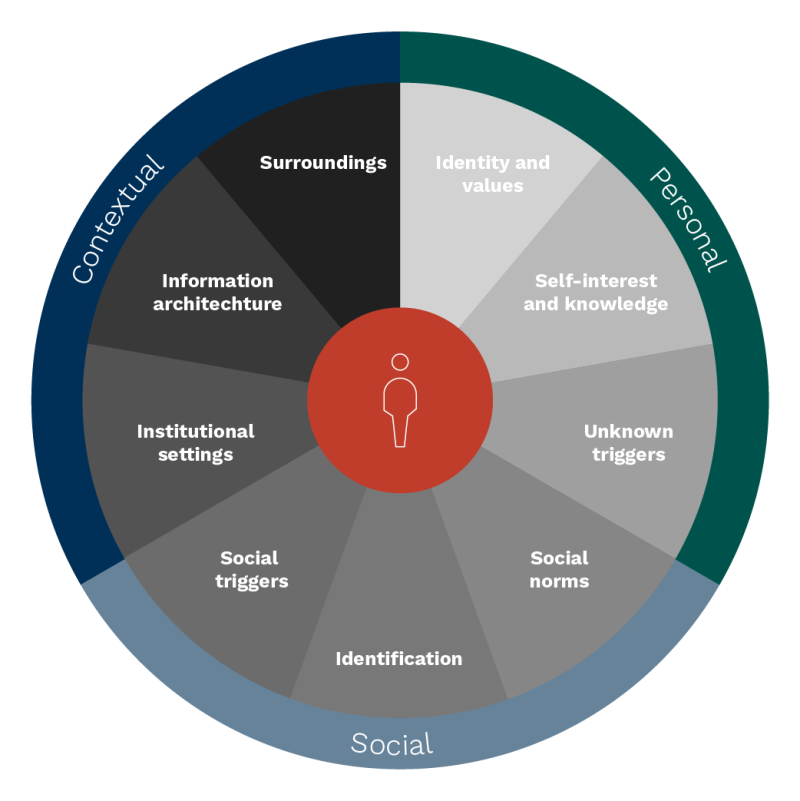
Behaviour Change
Overcoming the challenges that stand before our society today demands active contributions from citizens and users. That’s what some people call nudging and behavioural economics.
Overcoming the challenges that stand before our society today demands active contributions from citizens and users. That’s what some people call nudging and behavioural economics.
If you want to change behaviour, it’s important to understand what drives that behaviour. Are our habits deeply rooted or are we easily changed? What feelings are connected to our present behaviour? Is a specific human way of thought – so-called bias – at play? Or does something in the design of our physical environment make us behave in a specific manner?
On this foundation, it’s possible to design communication with a real potential to make effective behavioural change.
By combining a broad view of behaviour change research - the by now well-documented international cases - with many years of in-house experience in behaviour communication, we have condensed the vast amount of knowledge and insights into an analysis framework of nine basic behaviour drivers.
The nine drivers have been categorised under three different domains: contextual, social and personal drivers.

The contextual drivers
In this domain, we look at the physical environment, the information architecture in communication products, and the institutional settings around the behaviour we want to change.
For example, the research professors Duffy and Michelle Verges of Indiana University generated a 35 % increase in correct waste sorting and a 95 % reduction in material contaminated by food residues by redesigning throw-in holes in garbage bins, so they resembled the objects belonging to each bin.
Behaviour can be changed remarkably merely by ensuring that the relevant information is present at the decision-making moment and by presenting it in the right way.
For example, this has been proved by the effect of energy labelling in the entire EU, by which the sales of domestic appliances with lower energy consumption has increased.
The personal drivers
In this domain, focus is on identity, awareness, interests and the underlying psychological triggers that are often subconsciously at play.
For example, an experiment proved that it was possible to reduce insurance fraud by 10 % in cases where customers were asked to note on a form how many kilometres their stolen car had driven. The signature created a subconscious link between the customers’ behaviour and identity, which put a lid on the customers’ willingness to be dishonest throughout the form.
Another research experiment showed that customers are better at recycling used coffee cups when their name is written on the cup.
The social drivers
This domain is about our attachment to communities, our misunderstandings about what is considered normal behaviour in our social circle, and about social triggers such as the urge to give a gift in return when we have received one ourselves.
In an attempt to reduce the number of patients that didn’t show up for their appointment, a poster was put up in a waiting room saying: ”87 % of all patients came to their appointment last month”. This generated a 32 % increase in kept appointments.
Social norms can also have the “opposite” effect. For example, when a sign was put up in Arizona Petrified Forest National Park. In an attempt to bring theft of wood to an end, the sign said that 14 tons of wood was stolen from the park each year. The result backfired: the amount of theft increased by 200 %, because a social norm that “everyone steals wood” had been established.
Would you like to know more?
When our customers ask us to help change behaviours, the effort typically starts with an analysis, followed by a behaviour strategy and design:
This is how Operate completes a 360-degree behaviour analysis.
This is how Operate designs a behaviour-changing effort.
Read more about agenda-setting in Operate’s newsletter
Six times a year, you will receive new information about communication tendencies and trends, as well as invitations to events at Operate.
Please note that by subscribing to the newsletter you are also accepting that we can keep your contact details in our CRM system. Your information will not be given to any third party. You can unsubscribe at any given time, have your information deleted from our system or get information about what details about you we have on file by sending us an e-mail at dataansvarlig@operate.dk.












































